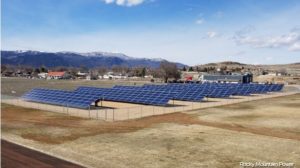The Scientists Are Screaming: Union Of Concerned Scientists Chastise U.S. Government On Storage Research Spending

By Frank Andorka, Senior Correspondent It’s a stretch to say these scientists sound shrill, but the Union of Concerned Scientists aren’t pulling any punches when it comes to how they feel about energy-storage research in the United States. The Union of Concerns Scientists are begging the U.S. government to get its act together (haha) and fund energy storage research, not only for the good of the planet but for the good of the country. They say that only through adequate use of battery storage can the United States achieve true energy independence. They also argue in their blog post that … Read More
This is your SolarWakeup for July 30th, 2018
The Results Case For Politicians. Jobs, economic growth, and local investments. Those are the pillars of political talking points in an economic stump speech. That’s what solar delivers and we have to work harder inside campaigns to push for our data to get into those speeches. I’d love to hear both sides arguing who is more pro-solar, which is happening a bit in a State representative race I am watching in Florida. Try to get involved in a race and add some talking points to the candidate's speech about consumer choice, job growth and putting money into the local community.
The $10Billion Deal. Last week I asked how you would invest $10billion in renewables and none of you had any ideas. And you missed your chance to make the pitch, instead, BP is putting it into shale gas. The point I am trying to make is that someone like Sunrun, First Solar or anyone else in the rundown today, would love to do $10billion in deals but can’t get that kind of scale on a single deal. The best thing for renewables is for this deal to be a bust, resulting in the investment lost which would cause the shareholders to demand another way.
We All Need To Stand With Resi. Anti-solar demand charges must be stopped by legislatures across the Country if the regulators won’t stand up for consumers. I’ve been thinking about a parallel to the solar industry. Why don’t utilities push back on LED lights, better AC’s or gas powered dryers/stoves and water heaters? The logic is exactly the same, consumers use less electricity. On the other hand, why wouldn’t consumers get a demand credit if they buy an electric car? The residential solar market is the lifeblood to the solar industry, no matter what segment you are in, you won’t see a growing market if consumers aren’t benefitting as well.
NV Energy Choice. This is an interesting twist to the ballot question on allowing corporations to go directly to generators. The Sierra Club and NRDC came out against the ballot question and sided with NV Energy. Apparently, some sort of side deal was made.
Quarterly Headaches. I’m not a stock analyst and seldomly play the markets, but one thing is certain. Running a company like First Solar that is deep in manufacturing, supply, and development with quarterly targets. A single project slipping by a few weeks could cause massive issues for the public company. How is the company supposed to work on 30-year projects if they have to think at 3-month time horizons? Same goes true for most other solar companies that are public, quarterly targets that adjust your cost of capital can’t be the best way to run a business.
Save On Labor, A Word From Quick Mount PV. You will start to see the innovative QRail from QMPV on the ‘shelves’ at your closest distributor. Gone are the days of splicing rails together on the roof using countless metal screws. With the bonded internal splice, QRail will save you time and money when you’re on the roof. Matched with the QClick clamps, you’ll love the way your installs get done in no time. quickmountpv.com
News
Opinions:
Have a great day!
Yann
An Interview With 8minutenergy Renewables: Martin Hermann On The Future Of Solar Module Price And Solar Development: Part I

By Frank Andorka, Senior Correspondent At Intersolar North America two weeks ago, I sat down with Martin Hermann, founder and CEO of 8minutenergy Renewables on the heels of their announcement of their Eagle Shadow Mountain project, which was signed at a flat rate of $23.76 per megawatt-hour throughout its 25-year PPA term, or 2.3 cents per kilowatt-hour. In Part 1 of our discussions, Martin Hermann and I talked about just how low he thinks module prices can go. In Part II, which will be posted later this week, Martin Hermann discussed the tariffs and their overall effect on the U.S. … Read More
Hey, Politicians: Clean Energy Jobs – Which Are Booming – Can Be An Electoral Winner If You Play It Right

By Frank Andorka, Senior Correspondent A recent report from Ohio Advanced Energy Economy (OAEE), the Buckeye State branch of Advanced Energy Economy (AEE), got me thinking about politics (not, admittedly, that it’s all that hard to do). According to OAEE, my home state now has more than 112,000 workers in the clean energy economy – more than are in all vocational training programs combined, and more than are employed in all car dealerships in the state (you have to be an Ohioan, I think, to understand the importance of the latter, but still). [wds id=”3″] Ray Fakhoury, legislative affairs director … Read More
This is your SolarWakeup for July 27th, 2018
The Module Future. Just when module prices started to stabilize, there is another word from the Chinese that may continue to manufacturer at higher levels. The official word is that the local market needs to cut costs and get competitive, in other words, it could mean to sell the modules for a lower price. I don’t know what this means for the US market but you’ve got to stay on your toes in this market for sure.
Moving Forward State By State. What is it about Massachusetts that shows a prominent future in so many ways for solar that stops the simplest of net metering cap increases from not being able to go through? The same logic goes with Connecticut because both CT and MA have similar politics and great potential for solar. MA has already created thousands of solar jobs and one of the most robust development communities but the NEM cap has been fought for several years with limited success. I hope that this year it will be different and the MA politics go in our favor. That being said, there must be a truth to solar having trouble with legislators from both sides of the aisle that have been in office for too long.
Offshore Wind. The concept of offshore wind is intriguing to me and for solar. Th reason is capital and the value that large capital investment flows means to renewable energy fund investors. The billions it costs to generate big energy in offshore wind will mean big funds that own that infrastructure.
Painful Future For IOUs. It can’t be overstated what the liability docket regarding the California fires in PG&E area could be to the future of PG&E. The issue could result in PG&E being caused to have to pay billions in repairs and other liabilities. What it means for PG&E is they need a regulatory bailout in the form of a favorable decision. On the other hand, this may result in a different future for IOUs, what should they look like?
News
Opinions:
Have a great day!
Yann
Chinese Module Companies Boost Production Despite Reduced Domestic Capacity

By Frank Andorka, Senior Correspondent When China suddenly decided to slash its domestic solar industry by cutting off its expansion of new plants and cutting back on subsidies to end-users, some in the industry thought it might be a boon to the U.S. solar industry. After all, those modules that were in the process of being produced had to go somewhere if they weren’t going to be used domestically, and the U.S. market – especially in light of the 30% tariffs – seemed a logical place for those modules to go. [wds id=”3″] And indeed, you’ve seen some of that. … Read More
Time Running Out On Massachusetts Solar Legislation, So Act Now

By Frank Andorka, Senior Correspondent With five days left in the legislative session, Massachusetts is running out of time to solidify and expand its burgeoning solar industry, and activists in the state are ramping up the pressure in an attempt to try to get something done before the end of the month. Yesterday, in an effort supported by advocacy group Vote Solar and others, city leaders from across the state joined forces to send a letter to the legislature urging them to pass the clean energy legislation currently pending before it, which is designed to accomplish three things: eliminiate the … Read More
This is your SolarWakeup for July 26th, 2018
Bloom Goes Public. Count me in as positively surprised. Bloom Energy has gone public and left room for the shares to go up 63% during their first day. With ~300MW of capacity deployed, Bloom is largely viewed as the potential for distributed energy for corporates that make up their customer list. 16 years of operation before going public was not the plan but many people thought this day would never come, so congrats to the Bloom team.
Value Of DG (Again). This is a topic that is frightening, what happens if hackers take over a grid or power plants and cause a long term power outage. Utility execs will tell you that cybersecurity is one of their biggest worries and we continue to hear about the threat, Homeland Security officials started raising red flags a decade ago. We talk about the cost shift that IOUs claim about solar but this is a value to the grid that solar folks rarely get traction on or get credit for creating. If you want to read some of the best reasons to buy your solar neighbor a beer, make sure to read Vote Solar’s Adam Browning’s Twitter feed.
Solar In Florida. Solar in Florida is going to grow at a rapid pace. Last year alone it doubled and this year it could double again before an exponential increase next year. I understand the Florida consumer and have heard my (former) neighbors talk about how badly they want solar. Moreover, you don’t have to ask any homeowners how much energy they use because with air conditioning you’ll never offset 100% of their usage. On the other hand, solar contractors that hope to go into the State will have to learn quickly that permitting and inspections are for real in Florida. You won’t get around installing subpar products without making sure that you are installing to the hurricane codes. In summary, don’t think you can give Floridians a cheap version of solar, you will have to plan on doing it the right way the first time.
Inside Look In SC Politics. This was the David vs. Goliath story that sounded like Goliath had exclusive access to special powers. South Carolina had all of the insider trading of an IOU exerting the power they have over the State legislators. I don’t know how much longer that power can exist before the largely republican legislators can no longer stand behind a monopoly when a free market is a better solution.
State Policies In MA and NJ. Keep your eyes and ears on the ongoing policies in MA and NJ. In MA, the solar industry is looking to increase the net metering cap once again and NJ is hoping to expand the market into the low income markets. Make sure to get a script and call list from your local solar advocates.
News
Opinions:
Have a great day!
Yann
In Other ‘Water Is Wet’ News, Stronger RPS’s Encourage Investment In Renewable Energy, Study Says

By Frank Andorka, Senior Correspondent There are days when you read about academic studies and wonder out loud, “Did we really have to study THAT?” As I read the excellent story on KSL’s (NBC, Channel 5, Salt Lake City) website about a study concerning renewable portfolio standards (RPS), I had just that sort of revelation. It seems that our intrepid researchers have discovered that states with stricter RPS’s encourage great investment in renewable energy. In other news, water is still wet and the Pope is still Catholic. [wds id=”3″] I’m not diminishing the work by KSL reporter Amy Joi O’Donoghue, … Read More
Russian Hackers: The Reason We Need A More Distributed Electrical Grid (Duh.)

By Frank Andorka, Senior Correspondent Because I need another thing to keep me up at night…. The Department of Homeland Security this week revealed that Russian hackers attacked our electrical grid last year and could have created electricity blackouts throughout the United States, thanks to our overreliance on a centralized grid. You’d think we’d have taken the hint by now. [wds id=”3″] But no. In Washington, the geniuses at the Department of Energy are still trying to figure out how to bailout economically untenable coal and nuclear plants. Cool. Newsweek reporter Jason Murdock has the terrifying details: Hackers working for … Read More

